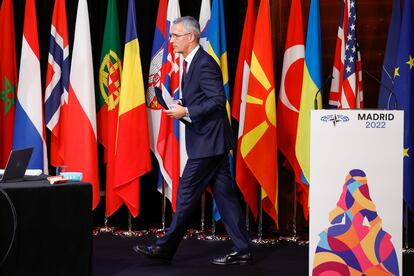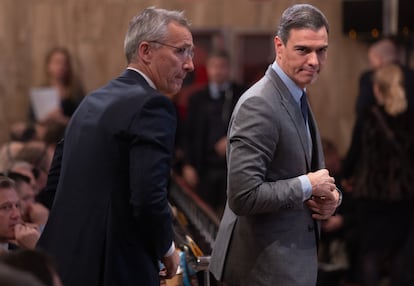NATO chief Stoltenberg: ‘Putin cannot win; it would be a catastrophe’
Speaking at the NATO assembly in Madrid, Spanish Prime Minister Pedro Sánchez called on Moscow to leave Kyiv ‘in peace’ and said the alliance has been strengthened by the Kremlin’s ‘ill-advised calculations’

NATO Secretary General Jens Stoltenberg and Spanish Prime Minister Pedro Sánchez opened the 68th Assembly of the alliance in Madrid with strong messages for Russian President Vladimir Putin, 271 days after Moscow launched its invasion of Ukraine on February 24. Stoltenberg, who last week sought to defuse a potential escalation of the conflict after a missile exploded on NATO territory in Poland, said that Putin had committed two “errors” in attacking Kyiv: underestimating Ukrainian resistance and the unity of the western allies. Sánchez used his speech in Madrid to deliver a concise demand to Moscow: “Leave Ukraine in peace.”
Stoltenberg warned the NATO parliamentarians gathered in Madrid that the alliance must be prepared for a lengthy war, while also noting that despite successful Ukrainian counter-offensives and territorial gains, it would “be a mistake to underestimate Russian military capabilities.”
“We have to be ready to support Ukraine [for] a long time,” the NATO secretary general added. “We cannot think that democracies cannot sustain their effort over time.”
Stoltenberg reiterated his belief that a definitive end to the war will come at the negotiating table rather than on the battlefield, but said that “if we want an acceptable outcome for Ukraine, the way to achieve it is to increase our support for Ukraine. We want negotiation, but we don’t want an outcome that means [the triumph of] the brutal use of force. Putin cannot win; it would be a catastrophe.”

Sánchez: ‘absurd war’ has united NATO
Sánchez added that as long as this “absurd war” continues, the allied countries will remain united at the side of the Kyiv government, in defense of democracy, sovereignty and the territorial integrity of Ukraine. The Spanish Prime Minister said that NATO has been strengthened “in the face of the ill-advised calculations” made by Putin, and praised “the promptness, determination and intelligence” with which NATO reacted to the invasion. Going forward, Sánchez called for “firmness, unity and temperance” to be maintained to avoid an escalation of the conflict, citing the allied reaction to the “accidental impact of a missile” on Polish territory, which implicitly ruled out a deliberate Russian attack, as Kyiv had initially claimed.
Ukrainian President Volodymyr Zelenskiy is due to speak via video link at the assembly later on Monday but used his daily address to the citizens of the war-torn country to reiterate defiance while some among the western allies are suggesting negotiation with the Kremlin: “The amount of Russian shelling unfortunately remains extremely high,” Zelenskiy said: “In the Luhansk region, we are slowly advancing while fighting. There have been almost 400 artillery attacks in the east since the beginning of the day.”
Among the areas where heavy artillery actions have been reported is the Zaporizhzhia nuclear power plant, where the International Atomic Energy Agency (IAEA) reported “powerful explosions” on Sunday. Ukraine and Russia have both accused each other of the attacks, which the director general of the IAEA, Rafael Grossi, has described as “playing with fire.”
The IAEA is set to carry out an inspection of the Zaporizhzhia nuclear power plant, Europe’s largest such facility, on Monday after heavy shelling over the weekend caused damage to some of its installations. The agency has confirmed that there have been no radioactive leaks as a result of the bombardments.
Sign up for our weekly newsletter to get more English-language news coverage from EL PAÍS USA Edition
Tu suscripción se está usando en otro dispositivo
¿Quieres añadir otro usuario a tu suscripción?
Si continúas leyendo en este dispositivo, no se podrá leer en el otro.
FlechaTu suscripción se está usando en otro dispositivo y solo puedes acceder a EL PAÍS desde un dispositivo a la vez.
Si quieres compartir tu cuenta, cambia tu suscripción a la modalidad Premium, así podrás añadir otro usuario. Cada uno accederá con su propia cuenta de email, lo que os permitirá personalizar vuestra experiencia en EL PAÍS.
¿Tienes una suscripción de empresa? Accede aquí para contratar más cuentas.
En el caso de no saber quién está usando tu cuenta, te recomendamos cambiar tu contraseña aquí.
Si decides continuar compartiendo tu cuenta, este mensaje se mostrará en tu dispositivo y en el de la otra persona que está usando tu cuenta de forma indefinida, afectando a tu experiencia de lectura. Puedes consultar aquí los términos y condiciones de la suscripción digital.









































